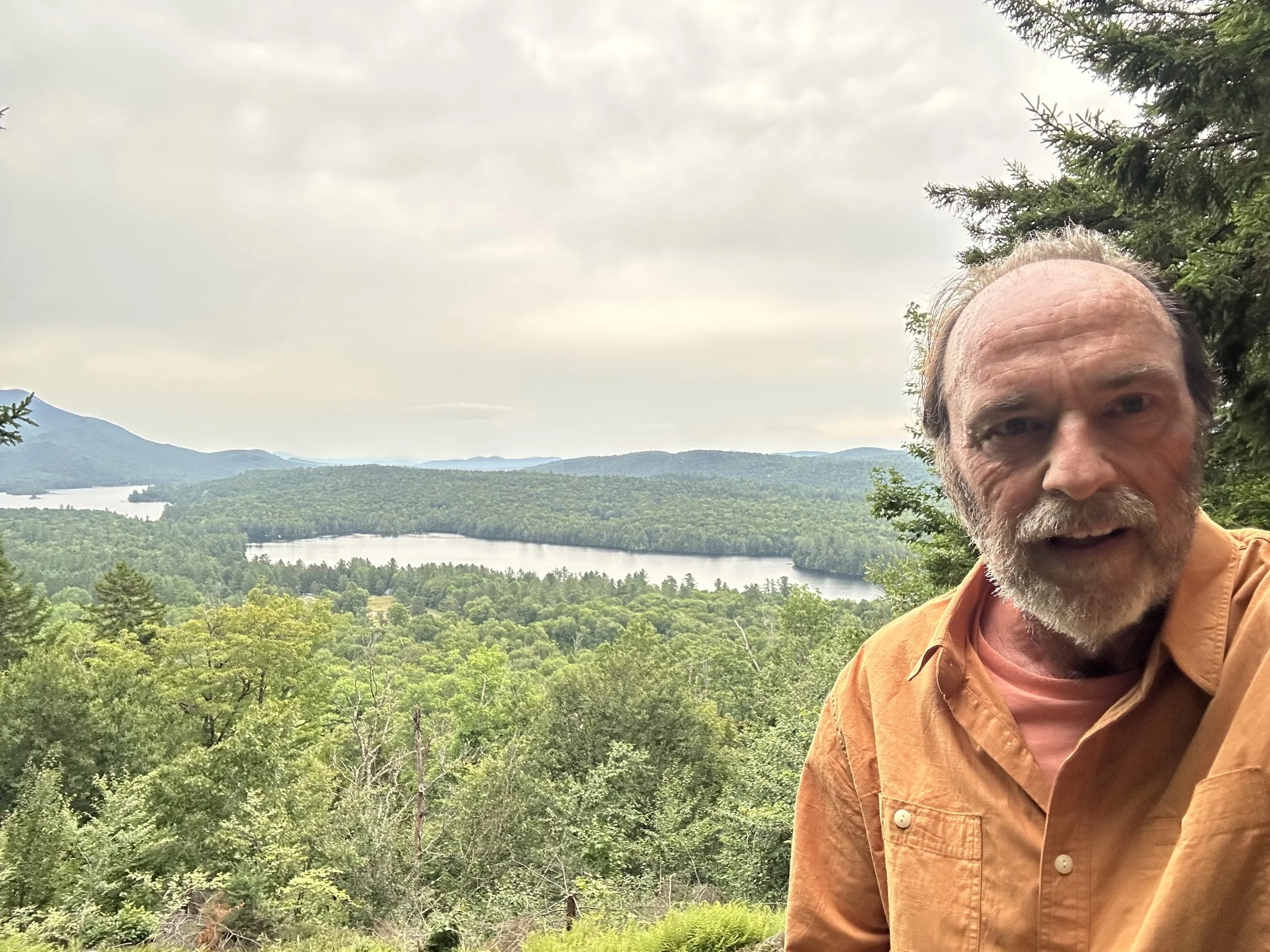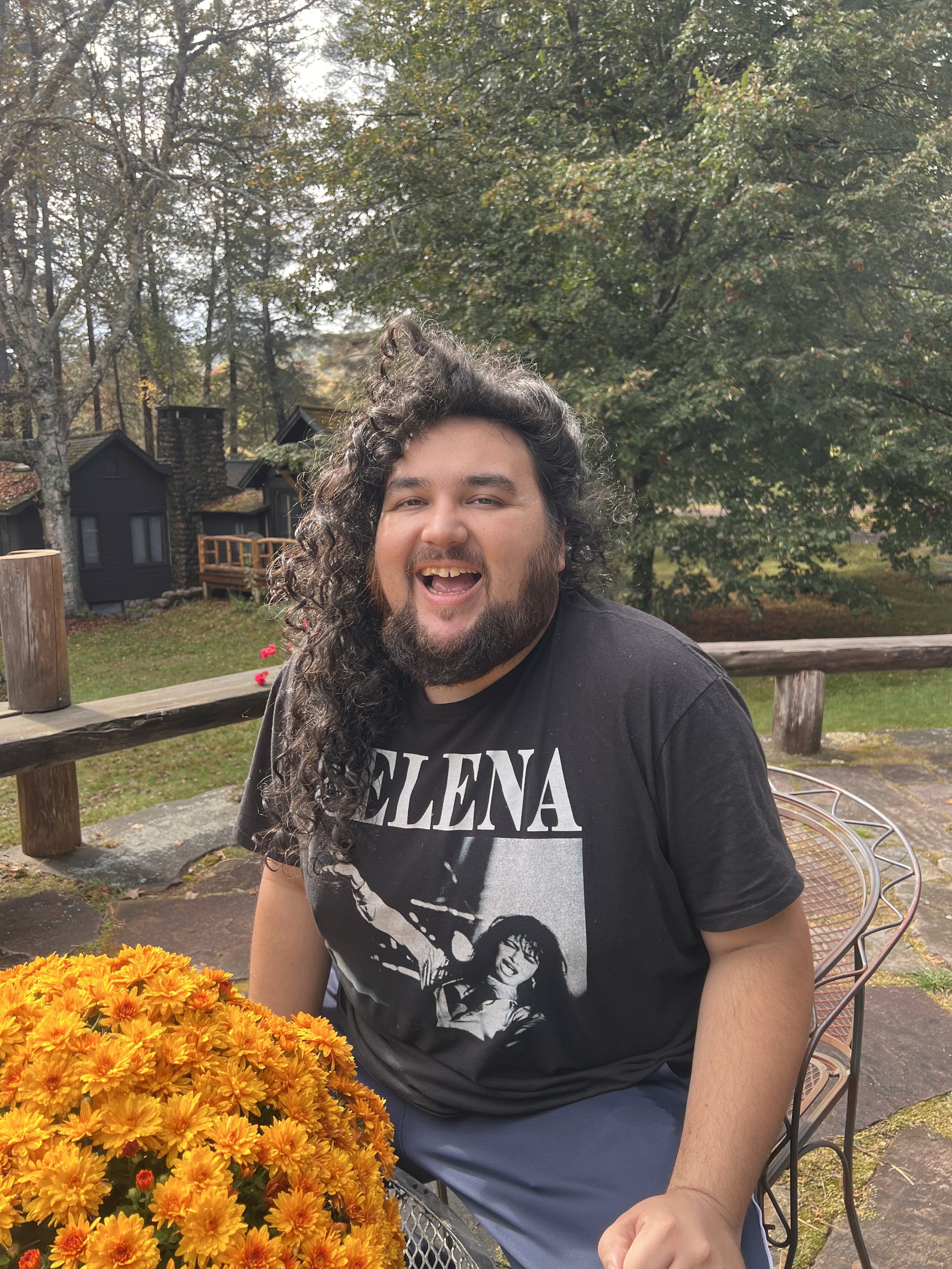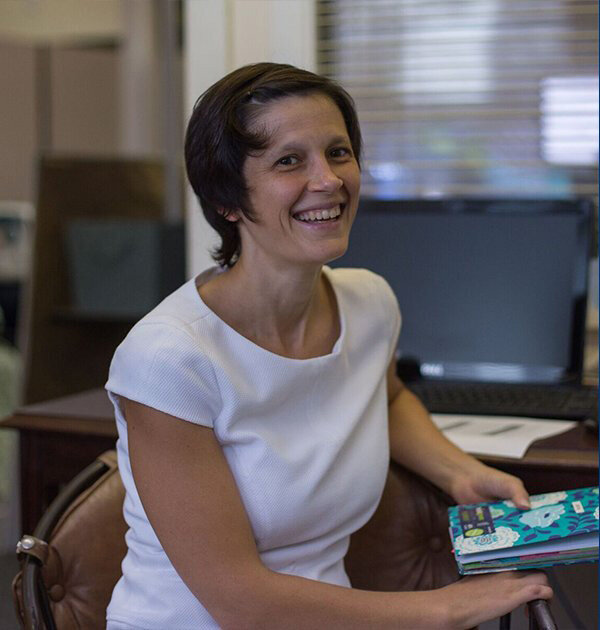Boren Chertkov Residency for Labor and Justice
2025 - Sandy Tolan
Wearing an orange shirt, Sandy smiles off to the right in selfie position, with the view of Eagle Lake and Blue Mountain from Lookout.
Sandy Tolan is a writer and journalist whose work focuses on the intersection of land conflicts, racial and ethnic identity, natural resources, and the global economy. In addition to reporting from over 40 countries in the last several decades, Sandy has produced hundreds of documentaries, features, and podcasts for NPR and other outlets, and helped found Homelands Productions, an independent journalism production company. His work has ranged from covering Standing Rock, to man made earthquakes in the oil country of Oklahoma, to Gaza’s water crisis. He has also authored three books, including The Lemon Tree.
At BMC, Sandy worked on his fourth book, titled Sweet and Lowdown: Wealth, Poverty, and the First Family of Sugar, a generational biography of a powerful Florida-based sugar dynasty. Arising out of a three-year investigative report in collaboration with Dominican/Haitian journalist Euclides Cordero Nuel of the Fanjul’s labor abuses on their plantations, the book traces the billionaire Fanjul family’s 160-year rise to wealth and examines the human and environmental cost of that wealth, including the stories of the people who, across Cuba, Florida, and the Dominican Republic, toiled for them, stood up to them, and survived them.
When not writing, Sandy could be found kayaking into the various lakes.
2024 - J. Martinez
Seated on a metal chair on a stone deck, J, who is wearing a Selena shirt, smiles at the camera and leans towards a bright bouquet of orange flowers. Behind them is a large tree and small cottages.
J. Martinez is an organizer, educator, facilitator, and strategist who is autistic, non-binary agender, and Latinx. In 2015, they co-founded The Campaign to Fight Toxic Prisons, serving now as its National Campaigns Director. Fight Toxic Prisons is an all-volunteer Black, brown, and Queer-led national collective of grassroots organizers committed to building lines of solidarity, intersectional analysis, and resource sharing across the movements for environmental justice, Black and Indigenous Liberation, and against mass incarceration.
By harnessing “the collective power of ordinary people,” J. Martinez has helped stop the construction of prisons in Kentucky and Alabama, advising hundreds of organizers and abolitionists along the way. To sum up J’s work in their own words, “I am committed to building the movement against mass incarceration in the South and Appalachia for the rest of my life.”
At BMC, J. Martinez sought to turn a catalog of 56 trainings they’ve developed with various grassroots teams into a more cohesive curriculum. Their time was also filled with restoration. Between getting their steps in, including a 30,000 step day, hosting movie nights and bonfires, and canoeing with Mar, J. Martinez found all the chipmunk homes around the clubhouse, and they may or may not have fed them oatmeal cookies when staff wasn’t around.
2023 - May Jeong
May Jeong triumphantly holds up her towel around her. Wearing a bathing suit and smiling, she has just emerged from the cold water of Eagle Lake, having led a group of brave fall residents to take a plunge.
May Jeong is an award-winning magazine writer and investigative journalist. In part due to her own family’s complex immigration history, she is interested in asymmetries in power relations. In 2012, she began reporting on a gang rape scandal in the Korean diaspora community in Toronto. Her story was nominated for the Canadian National Magazine Award the following year. From 2013 to 2017, she lived and reported in Afghanistan, covering women’s rights, presidential elections, and the effects of American foreign policy abroad in the form of resulting civilian casualties. As a reporter for Vanity Fair, she primarily reported on on sex work and how it intersects with the American criminal system. In 2022, she was awarded with the Whiting Nonfiction Creative Grant.
At BMC, she worked on the manuscript for her book THE LIFE: Sex, Work, and Love in America, a work of narrative nonfiction that explores the structural forces, as well as the individual choices, that come to shape the lives of sex workers of America in this century. Using archival research and first hand reporting, May hopes to engage the public in thinking deeply about the issue of sex work in new and intersectional ways as a leading civil rights issue of our time.
2022 - Prexy nesbitt
Born on Chicago's West Side, "Prexy" (Rozell W.) Nesbitt has spent more than five decades as an educator, activist, and speaker on Africa, foreign policy, and racism. A teacher and lecturer for many years throughout the United States, he has worked as a “red cap,” social worker, union organizer, and served as consultant and advisor in many capacities. He was active in the United States, Canada and Europe in the struggle to end apartheid. He also worked to end colonialism in Angola, Mozambique, Zimbabwe (former Rhodesia) and Namibia (former Southwest Africa). He is working on an autobiographical accounting of a lifetime of political organizing and social change activity that includes the US civil rights movement, the anti-apartheid movement, the antiwar movement, the labor movement, and alternative education initiatives. Unfortunately, Prexy was unable to join us at Blue Mountain Center.
2021 - Madeline Talbott
Madeline Talbott stands and stretches her arms with a big smile on the BMC dock at sunset. She is bundled up in a scarf, coat, and gloves - a marker of being a fall resident at BMC.
Madeline Talbott has been organizing for 37 years, first with ACORN in Dallas, Houston, Pine Bluff AR, Detroit and Chicago, and then with Action Now. She is retired and continues to organize locally in her neighborhood. She has three grown daughters and lives with her husband, Keith Kelleher, in Chicago.
She learned early on the value of community work and climbing on the shoulders of those who came before. Community organizing felt like a lifeline to Madeline, but she managed to make a huge number of both hilarious and tragic mistakes, as well as build some lasting relationships.
She had a chance to be a key part of:
Fight for 15’s origins;
Minimum wage and living wage campaigns in Chicago and Illinois;
Fight against bank redlining and predatory lending;
Base-building neighborhood by neighborhood in low income communities;
Coalition work;
Fights for more Black and brown teachers, support for public education;
Leadership and organizer recruitment and development;
Searching for a way to organize out of love rather than anger.
At BMC, she documented the important work she did in the labor movement, and sharing the lessons she learned.
2019 - Sarah k. khan
Sarah Khan smiles gently at the camera, sitting surrounded by bookshelves. Her dark hair contrasts with a bright red streak of hair - perfectly matching the red glasses atop her head.
Sarah K. Khan is a multimedia maker and scholar with a focus on women, migrants, biological and agricultural diversity, and sustainability. Through photography, film and video art, printmaking, maps, and writings, Khan reveals and honors the often-invisible lives and labor of women and migrants. Her work explores the emotions and lived experiences of those she encounters.
More recently, Khan has returned to focus on the more qualitative fieldwork she loves, documenting the lives of people whose knowledge and labor are usually unacknowledged and thereby provoking thought around identity, migration, and culture. Since 2013, she has completed 14 short films, over 28 articles, and 13 data-driven maps as part of her ongoing projects. Khan is assembling multimedia exhibits that explore the lives of spice porters of Old Delhi, and the women cooks and farmers in Fez, Morocco.
From 2014 to 2015, she collected multimedia content from several farming communities in India for her Indian women farmers’ film series, including issues such as globalization, climate change, environmental degradation, gender disparity, race and caste discrimination and more to present a complex picture of the lives of these farmers. She is planning on dedicating her time at BMC to develop the storyboards for this series.
2019 - Victor Yang
Victor Yang is wearing a bright red shirt, glasses, and has one backpack strap on his shoulder. He looks off to his left, surrounded by leafy plants in a forest.
Victor Yang is a queer organizer and writer. The son of Chinese immigrants, he has been fighting for immigrant and labor justice for a decade.
His work began as a volunteer case-worker and then coordinator for a program called Project HEALTH, where he spent four years working with single mothers of color, helping them apply for public benefits, secure safe housing, and advocate for their children. He then spent five years learning from ACT UP (the AIDS Coalition to Unleash Power), a direct action AIDS activist group. He received a Rhodes Scholarship to the University of Oxford, where he helped push the administration to launch the first summit on race in its 800-year history. These efforts sparked a curricular review and institution-wide initiatives to increase the voices of women and people of color on campus.
From 2015 to 2018, he led and worked on campaigns alongside low-wage workers in Boston. His organization, 32BJ SEIU District 615, represents 18,000 workers in the New England area, the majority of whom are Latinx janitors. Since the 2016 election, his work has been focused primarily on immigrant rights. He helped launch his union’s inaugural Social Justice Leadership Academy, a bilingual program that empowers its members to teach others about systemic injustice and collective resistance. He has been instrumental in coordinating campaigns for immigrant rights in places like Everett, MA, and in organizing large populations of new immigrant voters to win certain crucial elections and ballot initiatives in Massachusetts.
While at the BMC, he worked on both fiction and non-fiction. He edited pieces in a short story collection featuring a multi-generational cast of characters who embody the struggle and resistance of Chinese and Latinx immigrants. He also drafted and revised essays that reflected on his difficulties, defeats, and joys as an organizer. He believes that documenting loss and contradiction in the movement is crucial to understanding what is required to win in our communities.
2017 - Ashley makar
Ashley Makar is the Outreach Coordinator for Integrated Refugee and Immigrant Services (IRIS) in New Haven, Connecticut. She’s also a contributing editor to Killing the Buddha (KtB), an online magazine about religion and culture. Before finding her vocation working with refugees, she studied theology and social ethics at Yale Divinity School. She holds an M.A. in Journalism and Middle East Studies from NYU.
In 2015, Ashley published You Were Strangers, a collection of essays about prayer, living with cancer and her travels to follow the stories of refugees in Egypt and Israel. It was the research for this book, bearing witness to the injustices many refugees face, and a conviction that writing or making art about vulnerable populations might be inherently exploitative, that ignited a desire to work directly with refugees seeking resettlement.
At IRIS she works to help refugees find housing, access public benefits, find work, learn English, etc. Drawing on the perspective this work has given her, for the past three years Ashley has been collaborating with displaced refugees resettling in the U.S. to tell their stories. “I am not just writing about them; I’m also writing with them,” she says.
Since 2015 when Syrian refugees became the focus of national controversy, igniting an intense debate between those who objectified Syrians as potential terrorist threats and those who “endorse the humanitarian ethic of welcoming people who’ve been displaced by war […] and tend to objectify refugees as victims Americans should save”, Ashley has been working to tell a different narrative — one that casts refugees as neither threats nor victims, but the people they are.
She’s written essays, op-eds and sermons that engage diverse audiences and used her time at Blue Mountain Center to turn this growing body of work into a proposal for a creative non-fiction book project, which she envisions as a collection of essays, interspersed with poems, stories and drawings by refugees.
2016 - Kung li
Kung Li is an attorney and activist for the reform of the criminal justice and immigration systems. They were a litigator and then director of the Southern Center for Human Rights in Atlanta, specializing in prison and jail cases in Georgia and Alabama. After leaving SCHR, Kung Li helped support the "I am Troy Davis" campaign in the lead up to Davis's execution, and went on the road to document the "Undocumented and Unafraid" movement. From 2014 to 2015, Kung Li directed the Sunrise Initiative (formerly the US Human Rights Fund). They conduct trainings to support grassroots organizing, criminal justice, and immigration reform.
Kung Li devoted part of their time at BMC to a project that retraces Alexis de Tocqueville's 1831 tour of American prisons. The project involves a three-month-long itinerary, which includes a day with Trayvon Martin's mother, a walk through Alabama's women's prison with its former warden, an interview with John Lewis about his experience as a Freedom Rider imprisoned at Parchman Farm, dinner with Angola Prison's in-house journalist Wilbert Rideau to prepare for an interview with Angola's famously slippery warden Burl Cain, and three days in Jena, Louisiana with families of the Jena Six.
Kung Li also spent more time than initially anticipated working on a novel of speculative fiction. And as they described in their presentation to residents and staff, the two projects aren't entirely disconnected. The presentation offered a moving meditation on the idea of dual stories, fusing parts of the novel with the trip tracing de Tocqueville: "We tell ourselves a narrative as Americans — what happened in the past is what should have happened — but what if that isn't the case?"
2015 - John provost
John Provost is a partner at Beeson, Tayer & Bodine (BT&B), a California law firm that has been representing public and private sector unions and workers since its establishment in the 1930s. Provost joined BT&B in 1986 after graduating from University of the Pacific McGeorge School of Law. He has also taught private and public sector labor law at University of California, Davis, and served as and Executive Committee Member of the Labor and Employment Section of the Sacramento County Bar Association.
John Provost began his career in labor shortly after graduating from San Francisco State with an undergraduate degree in Journalism. During his first post-collegiate job at local California newspaper he quickly discovered that profits reigned over quality writing and fair employment practices. John joined the International Typographical Union (ITU), where he rose as a leader among his co-workers, participating in negotiations and advocating for fellow employees as a shop steward.
Like many leaders in the labor movement, John’s experience as shop steward and rank-and-file union member led him to see the injustices in the American labor market more broadly. Motivated by his time in the ITU, Provost enrolled in the McGeorge School of Law with an interest in providing legal representation for unions and employees.
John has negotiated dozens of labor agreements and represented unions and employees in hundreds of labor arbitrations, administrative hearings, and trials during his tenure at BT&B. Over the course of Provost’s career he was a colleague and close friend of Boren Chertkov. Provost and Chertkov shared an interest in California industries’ treatment of immigrant workers; Chertkov was a zealous advocate for immigrant workers in the agricultural industry, a legacy that Provost carries into his advocacy for immigrant women in the dairy factories of central California.
John has continued writing during his free time while practicing law, regularly contributing pieces to various labor publications. John spent his time at BMC finalizing a book draft that chronicles the story of a group of immigrant workers and their attempt to organize a large California dairy plant.
2014 - Jane Mcalevey
Jane McAlevey is a lifelong organizer for environmental and labor justice. Early in her career, she worked at the Earth Island Institute, Highlander Research and Education Center, and the Veatch Foundation. She was later recruited to work on the Geographic Organizing Project with the AFL-CIO in Stamford, Connecticut. The project was an experimental multi-union campaign, and Jane’s first foray into social movement unionism.
From the AFL-CIO she was recruited as the national deputy director for strategic campaigns of the Healthcare division of the SEIU, and later appointed the Executive Director of SEIU’s Nevada local. Under Jane’s leadership, the Nevada local reached the highest membership level in a Right to Work state in the history of SEIU.
Jane’s success in the labor movement is in no doubt a direct result of her steadfast belief in what she calls “whole-worker organizing” and social movement unionism. She writes in depth about her organizing in Raising Expectations (And Raising Hell); My Decade Fighting For the Labor Movement (2012), co-authored with Bob Ostertag. Jane maintains an uncompromising faith in the power potential of a well-organized work force at a time when much of the left has lost faith in the labor movement’s capacity to organize the rank and file, much less mobilize for social change.
While at Blue Mountain Center, Jane was pursuing a PhD in Sociology at the CUNY Graduate Center in addition to consulting with unions and community organizations and regularly contributing to various news publications. Jane was able to pen five significant pieces during her residency, including “Labor’s Only Real Choice,” published in The Nation and widely reprinted; “Forging New Class Solidarities: Organizing Hospital Workers” published in The Socialist Register, AlterNet and Truthout; and “Harris vs. Quinn - Separate and Not Equal,” which appeared in Waging Non-Violence.










